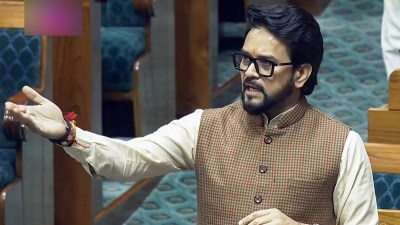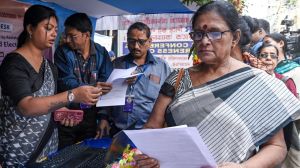Why 12 ex-Mahayuti ministers got the axe in new Fadnavis Cabinet
Various reasons ranging from rows and underperformance to strained ties with allies are seen to have caused the ouster of these ex-ministers, including senior faces.
 BJP MLA Ravindra Chavan and NCP leader Chhagan Bhujbal. (Photos: X)
BJP MLA Ravindra Chavan and NCP leader Chhagan Bhujbal. (Photos: X)The ruling Mahayuti in Maharashtra sprang a few surprises Sunday, when Chief Minister Devendra Fadnavis’ new Cabinet took shape with 39 ministers taking oath of office.
While the Cabinet has some new entrants, 12 ministers from the previous Mahayuti government – including senior leaders like the NCP’s Chhagan Bhujbal and the BJP’s Sudhir Mungantiwar and Ravindra Chavan – failed to make the cut.
Here is a look at the careers of former ministers who failed to find a place in the new Cabinet – and possible reasons why they were dropped.
Chhagan Bhujbal (NCP, Yeola)
A seven-time MLA, former deputy CM and a key figure in the NCP led by Ajit Pawar, Bhujbal has been a part of the Maharashtra Cabinet since 1999, except for the period during Fadnavis’ first term as the CM between 2014 and 2019, when he spent 26 months in jail on charges of money laundering.
One of the tallest OBC leaders in the state, Bhujbal was said to be an “automatic choice” for a ministerial berth following the Mahayuti’s massive win but his leadership style triggered significant opposition, especially on his home turf, Nashik, as leaders, including those from his own party, opposed his nomination as a minister.
Bhujbal’s decision to field his nephew Sameer as a rebel candidate against Shiv Sena MLA Suhas Kande in Nandgaon also worsened his already strained ties with the Sena.
Though Bhujbal faced heat from the first Fadnavis government and was jailed as a consequence of a probe in 2016, when the BJP-united Sena ran the affairs of the state, he was inducted into the Mahayuti Cabinet after Ajit and Eknath Shinde rebelled and split the NCP and Shiv Sena respectively before joining hands with the BJP.
With the BJP winning 132 seats on its own, Bhujbal, who had vocally opposed the Maratha reservation within the OBC category, now finds himself sidelined. His exclusion also signals a shift in the priorities of the new government.
Sudhir Mungantiwar (BJP, Ballarpur)
A senior BJP leader, former minister and seven-time MLA, Mungantiwar started his political journey with the Sangh Parivar as a student leader and since 1995, has served the BJP in various organisational capacities including as the state party president.
Though known for his organisational skills, Mungantiwar, an ambitious leader, was said to have waded into troubled waters after he showed initial reluctance to contest the Chandrapur Lok Sabha seat.
While his exclusion from the Fadnavis Cabinet is being seen as a bid to “keep him in check”, Mungantiwar’s long-standing association with the BJP may land him a crucial role in the party organisation.
Ravindra Chavan (BJP, Dombivli)
Chavan found himself out of the Cabinet despite being one of Fadnavis’ most trusted allies, a three-time MLA and former minister who held key portfolios like PWD in the previous ministry.
Seen as a loyal BJP face, Chavan stood his ground in Shinde’s stronghold of Thane and emerged as a key figure for the local BJP leadership, which was opposed to Shinde and his son Shrikant.
While the BJP-Sena dispute in Thane was resolved by the senior leadership of both the parties, Chavan’s commitment to the party has seemingly not gone unnoticed. There is a buzz that he is being groomed for a more significant role with some quarters suggesting that he may replace Chandrashekhar Bawankule, who was inducted into the Cabinet, as the state BJP chief.
Vijay Kumar Gavit (BJP, Nandurbar)
A notable figure in Maharashtra politics for the past two decades, Vijay Kumar Gavit, a seven-time MLA who has served as a minister in various governments, Gavit joined the BJP in 2014 and was made a minister in August 2022.
Prior to joining the BJP, he had been accused of corruption during his tenure as a minister in the Congress-NCP government.
His political strategy in the run-up to the Assembly polls had raised eyebrows in the BJP. Gavit, seen to be the patriarch of the influential Gavit family, had fielded four relatives – including his daughter and former BJP MP Heena Gavit – in the district on various party tickets in a bid to expand his influence, triggering dissent not only from his own party but also from ally Sena.
The BJP’s decision to keep him out of the Cabinet is being seen as a bid to send out a message that it would not reward leaders who challenge its unity and discipline.
Abdul Sattar (Shiv Sena, Sillod)
The Sena’s lone Muslim MLA who had previously served as a minister in the Congress-NCP governments, Sattar is a four-time MLA with a chequered track record.
After he sided with Shinde, the BJP reluctantly accepted him in the Cabinet despite having accused him of alleged corruption earlier.
For a long time, Sattar had also been a target of right-wing Hindu groups, which accused him of allegedly working against the interest of the majority community in his constituency, which has around 20% Muslims.
Adding to his woes in the recent Assembly elections, the BJP refrained from campaigning for him. It did not come as a surprise in the state political circles that he failed to enter the Cabinet despite an aggressive push for a ministerial berth.
Tanaji Sawant (Shiv Sena, Paranda)
A two-time MLA, Sawant is a businessman with declared assets amounting to Rs 235 crore who operates educational institutions across the state.
He embarrassed the Mahayuti ahead of the polls after he said he felt “sick” and “vomited” every time he was forced to sit with the NCP ministers in Cabinet meetings. Though he clarified that he intended to highlight the ideological difference between the allies, a fuming NCP threatened to walk out of the Mahayuti over the remarks.
His public outbursts, strained ties with the NCP, tendency to make impulsive statements and a perceived lack of political acumen may have led to Sawant losing his ministerial berth.
Deepak Kesarkar (Shiv Sena, Sawantwadi)
A four-time MLA and Shinde’s close aide Kesarkar, who was instrumental in shaping public opinion in favour of the former CM at a time when Sena (UBT) chief Uddhav Thackeray was gaining sympathy following Shinde’s “betrayal”.
His persuasive and measured approach to counter the Sena (UBT)’s narrative solidified his position as a key communicator of the Shinde camp but questions surrounding his performance as the Education Minister in the previous Shinde Cabinet seemed to have cost him a new berth.
Also working against him was his strained relationship with the Rane clan and suspicions of him working against the BJP, especially Narayan Rane, in the Lok Sabha polls. What could also have made it easier to exclude Kesarkar from the new Cabinet is his relatively low political influence.
Dilip Walse-Patil (NCP, Ambegaon)
Dilip Walse-Patil began his career as the personal secretary of NCP patriarch Sharad Pawar. An eight-time MLA, Walse-Patil has held several key posts including those of the Assembly Speaker and the Finance Minister.
He sided with Ajit in the wake of the NCP’s split and was appointed Minister of Cooperatives in the Shinde Cabinet. Citing his failing health, his supporters hinted that Walse-Patil voluntarily opted out of the Cabinet for “the time being”.
Suresh Khade (BJP, Miraj)
A four-time MLA and ex-Labour Minister, Khade’s perceived “underperformance” and the BJP’s tendency to promote new faces seemingly played a role in his ouster from the Cabinet.
Sanjay Bansode (NCP, Udgir)
One of the few Dalit faces of the NCP and a two-time MLA, Bansode was Minister of Sports and Youth Affairs in the Shinde Cabinet. He seemingly lost out on a Cabinet berth as several party leaders were vying for a limited number of Cabinet positions which fell under the NCP’s quota.
Dharmarao Baba Atram (NCP, Aheri)
Hailing from the tribal royalty in Gadchiroli district, four-time MLA Atram is seen to have a significant base among tribal communities of the region.
Despite having a three-decade-long political career, Atram’s influence is restricted to Gadchiroli. His lack of visibility at a time where there was greater demand for accountability from the ministers seemed to have led to his exclusion from the Cabinet.
Anil Patil (NCP, Alamner)
A close associate of Ajit and two-time MLA, Anil Patil got a ministerial berth in the Shinde government despite being a first-time legislator. However, the party’s “rotational policy” led to his exit from the Cabinet now.
- 01
- 02
- 03
- 04
- 05































